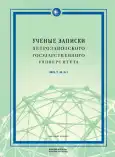RUSSIAN-GREEK TRANSLATION OF MUTATIONAL DERIVATIVES WITH THE PREFIX ПРО- IN ANTON CHEKHOV’ WORKS
- Authors: Amanaki M.I.1
-
Affiliations:
- National andKapodistrian University of Athens
- Issue: Vol 46, No 1 (2024)
- Pages: 95-103
- Section: Articles
- URL: https://journal-vniispk.ru/2542-1077/article/view/293261
- DOI: https://doi.org/10.15393/uchz.art.2024.997
- ID: 293261
Cite item
Full Text
Abstract
Translation of classical works has an impact on their perception by an international audience of readers.The question of the possibility of an equivalent transfer of multilevel meanings of a literary text and the writer’sintention, as well as the degree of permissible influence of the translator’s personality and their individual interpretationon the translated text does not have an unambiguous answer. In the process of literary translation, linguo-cognitiveinformation plays an important role, revealing the hidden semantic meanings of linguistic units and influencing theunderstanding of the text. The subject of the study is prefixed verbs with mutational meanings, their impact on theunderstanding of literary texts, and the importance of their correct translation. This article examines the translation ofthe mutational meanings of three derivatives with the prefix –pro (проспать (oversleep), пропить (drink away) andпроговариваться (let slip)) in the works of Anton Chekhov into Modern Greek, namely the frequency of their use andthe importance of the equivalent translation. The methodology of the research comprised the comparative analysis ofverbal derivatives in Chekhov’s texts and their translations into Modern Greek, as well as the comparative analysis ofdictionary entries of explanatory dictionaries, and methods of corpus linguistics. The linguistic correspondencesbetween Russian and Greek create a unique field for a comparative study of prefix derivation and the development of the mutational semantics of prefixes in both languages. The linguo-cognitive analysis helps to achieve equivalence in literary translation, and its results need to be applied when translating the works of great Russian writers into Modern Greek.
About the authors
M. I. Amanaki
National andKapodistrian University of Athens
Author for correspondence.
Email: maria.amanaki@yahoo.com
References
- Borovikov, A. A. Mutational verbs with the prefix pro- with the meaning of an unplanned negative result in the history of the Russian language: Diss. Cand. Sc. (Philology). Rostov-on-Don, 2012. 251 p. (In Russ.)
- Borovikov, A. A. To spend or to waste? (Representations of the frame ‘to spend on live support’ within prefix pro verbal model in the history of Russian). Pushkin Leningrad State University Journal: Philology. 2012; 2: 55–61. (In Russ.)
- Borovikov, A. A. Evolution of the derivational base of the group of verbs with the prefix pro- with the meaning of loss. Proceedings of Southern Federal University. Philology. 2012; 1: 97–103. (In Russ.)
- Dobrushina, E. R. On the problem of semantic integrity of Russian preverbs. Topics in the Study of Language. 2011; 5: 31–43. (In Russ.)
- Lebedeva, N. B. Polysituational analysis of the verb semantics. Moscow, 2010. 192 p. (In Russ.)
- Petrukhina, E. V. Aspectual categories of the verb in the Russian language in comparison with the Czech, Polish, and Bulgarian languages. Moscow, 2000. 256 p. (In Russ.)
- Plotnikova, G. N., Hemsakun, Ch. Types of modified meaning of prefixed verbs of characteristic speech activity. Pushkin Leningrad State University Journal. 2015; 1: 74–82. (In Russ.)
- Tabachenko, L. V. Prefixed positional verbs in the history of the Russian language: polyaspect analysis: Diss. Cand. Sc. (Philology). Rostov-on-Don, 2011. 448 p. (In Russ.)
Supplementary files








